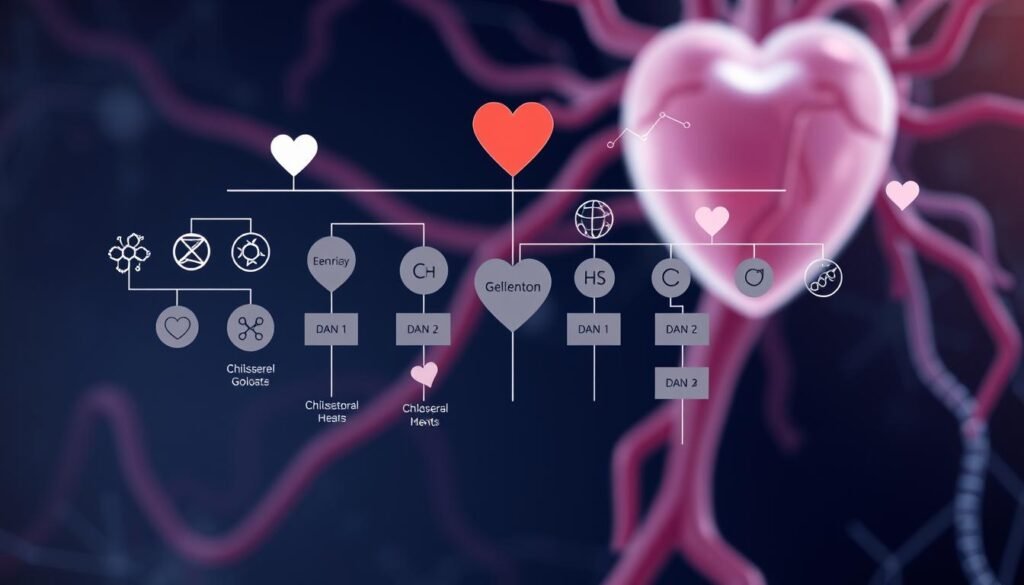Ever wondered why some people get high cholesterol even with a good diet? It’s important to know what causes high cholesterol to keep your heart healthy. This article looks at major reasons, including diet, lifestyle, and genetics. By knowing these, you can better manage cholesterol and avoid heart disease and stroke.
Key Takeaways
- High cholesterol can lead to serious health issues.
- Diet plays a crucial role in cholesterol levels.
- Genetic factors can influence cholesterol production.
- Lifestyle choices significantly impact cholesterol management.
- Understanding key factors aids in effective prevention.
- Regular check-ups are important for monitoring cholesterol.
Understanding Cholesterol and Its Types
Cholesterol is key for our body. It helps make hormones, vitamin D, and bile acids. There are two main types: LDL and HDL cholesterol. Knowing about them helps keep our hearts healthy.
LDL is the “bad” cholesterol. It can block arteries, leading to heart attacks or strokes. HDL, the “good” cholesterol, clears LDL from our blood. This helps avoid heart problems.
Triglycerides are another type of fat in our blood. They provide energy. But, high levels can hurt our heart health.
To manage our cholesterol, it’s important to know about LDL, HDL, and triglycerides. Seeing a doctor regularly, eating right, and staying active can make a big difference. These steps can keep our heart strong and healthy.
| Cholesterol Type | Description | Impact on Health |
|---|---|---|
| LDL Cholesterol | Low-density lipoprotein, often referred to as “bad” cholesterol. | Can lead to plaque build-up in arteries, increasing the risk of heart disease. |
| HDL Cholesterol | High-density lipoprotein, known as “good” cholesterol. | Helps remove LDL cholesterol from the bloodstream, reducing heart disease risk. |
| Triglycerides | A type of fat found in the blood, serving as an energy source. | High levels can contribute to heart disease and are often linked to obesity. |
What Causes High Cholesterol
High cholesterol comes from different factors that affect the body’s lipids. It’s key in many body functions and is affected by how we live and our genes.
Types of Cholesterol
There are two main kinds of cholesterol: LDL and HDL. LDL is called “bad” cholesterol because it can clog arteries. On the other hand, HDL is “good” cholesterol since it carries cholesterol to the liver for removal. It’s important to keep these two in balance for heart health.
Role of Cholesterol in the Body
Cholesterol is vital for making cell walls, hormones, and vitamin D. The body needs it to work well. But too much LDL cholesterol is dangerous. Being aware of what raises cholesterol and genetics is crucial for avoiding health issues.
| Cholesterol Type | Description | Health Impact |
|---|---|---|
| LDL | Low-Density Lipoprotein | Can lead to plaque formation in arteries, increasing heart disease risk |
| HDL | High-Density Lipoprotein | Removes cholesterol from the bloodstream, protecting against heart disease |
Diet and Its Impact on Cholesterol Levels
The link between what we eat and cholesterol is huge. Eating a lot of high cholesterol foods is bad for health. It’s important to know which foods raise cholesterol and choose healthier options.
Foods that Contribute to High Cholesterol
- Red meats
- Full-fat dairy products
- Processed foods
- Baked goods made with hydrogenated oils
- Fried foods
These foods are rich in saturated and trans fats, raising “bad” cholesterol. Swapping them for low-fat choices helps manage cholesterol better.
Healthy Eating Habits for Lowering Cholesterol
Striving for a balanced diet is key for good cholesterol levels. Adding certain foods can really help. These important foods are:
- Foods rich in omega-3 fatty acids: Like salmon, mackerel, and flaxseeds.
- Soluble fiber: Found in oats, beans, and certain fruits like apples and pears.
- Fruits and vegetables: Eating different colors gives you many nutrients.
These foods are good for a cholesterol-friendly diet. They help lower “bad” LDL cholesterol and raise “good” HDL cholesterol. Eating more whole, unprocessed foods is great for heart health.
Hereditary Factors and Genetics
Genetics influence cholesterol levels more than we may realize. People have a higher chance of high cholesterol if their family does too. Our genes decide how well our body handles cholesterol.
Knowing about these genetic factors helps us understand our health better. It shows us what risks we might face.
The Role of Family History
A family history of high cholesterol is a warning sign. It shows a genetic link to cholesterol issues. Those with family histories should keep an eye on their cholesterol levels.
This might lead to positive changes. For example, eating better or getting checked more often.
Understanding Familial Hypercholesterolemia
Familial hypercholesterolemia is a genetic problem. It causes very high cholesterol because the liver can’t remove LDL cholesterol well. This can lead to heart problems unless it’s managed.
It’s important to know about this condition. If found early, people can manage it better. Knowing can help save lives.

Obesity’s Connection to High Cholesterol
Obesity and cholesterol levels are closely linked, affecting our health. Being overweight can alter your cholesterol negatively. It increases the “bad” LDL cholesterol and triglycerides while decreasing the “good” HDL cholesterol. Learning how weight impacts cholesterol is essential, especially for people fighting obesity. This information underlines the need for good weight control plans.
How Excess Weight Affects Cholesterol Levels
Too much body fat messes with how our bodies handle fats. Research shows that obese people usually have higher triglyceride and lower HDL cholesterol levels. These changes can lead to heart disease and other heart-related problems. Knowing about this link emphasizes the importance of managing our weight carefully.
Strategies for Weight Management
There are several ways to tackle obesity and its effects on cholesterol:
- Choosing a diet with lots of fruits, veggies, whole grains, and lean meats can help reduce cholesterol.
- Regular physical activities like walking, swimming, or biking are key in controlling weight.
- It’s important to set goals that are realistic to stick with them in the long run.
- Getting help from doctors or support groups can also support positive lifestyle changes.
By following these weight management strategies, you can better your cholesterol levels and your overall health. For more information on how obesity affects cholesterol, please visit this resource.
The Effect of Smoking on Cholesterol
Smoking greatly affects your cholesterol, leading to many health problems. It changes your cholesterol levels in a bad way. Smoking increases “bad” cholesterol (LDL) and decreases “good” cholesterol (HDL).
This causes plaque to build up in your arteries. It makes heart disease risks go way up.
How Smoking Impacts Lipid Levels
Smoking causes a lot of harmful changes in your body. It makes bad cholesterol go up and good cholesterol go down. This sets the stage for heart problems.
Cigarette chemicals harm your blood vessels. This increases the chance of atherosclerosis. Fatty deposits block arteries, hurting blood flow and raising chances of heart issues.
Benefits of Quitting Smoking for Cholesterol Control
Quitting smoking brings big benefits for managing cholesterol. Stopping smoking boosts good cholesterol, improving cholesterol balance. It also lowers risks for heart disease and stroke significantly.
Choosing not to smoke improves cholesterol control and overall health. For more info on how smoking affects cholesterol, check this resource.

Lack of Exercise and Cholesterol Levels
Regular exercise is key to managing cholesterol. Exercise has a big impact on our health, especially on our cholesterol. Not moving enough can lead to bad cholesterol levels.
Working out often helps keep your heart healthy and can stop heart disease.
How Physical Activity Affects Cholesterol
Exercise is a great way to control cholesterol. It boosts good cholesterol and lowers bad cholesterol, helping your heart. Without exercise, you might gain weight. This could make cholesterol problems worse. Over time, this becomes a dangerous cycle.
Recommended Exercise Routines
To fight cholesterol problems, aim for 150 minutes of aerobic exercises like walking or cycling each week. These activities improve your cholesterol. Also, add strength training twice a week for better fitness.
Following these workout tips is crucial for better cholesterol and health. Even small changes towards being more active can help a lot. For more tips on managing cholesterol, check out this guide.
Diabetes and Its Influence on Cholesterol
Diabetes changes how the body handles cholesterol. People with diabetes usually have more LDL (bad cholesterol) and triglycerides. At the same time, their HDL (good cholesterol) decreases. This change leads to a higher heart disease risk due to blood sugar effects on cholesterol. The link between cholesterol and blood sugar is critical for those with diabetes.
The Relationship Between Diabetes and Cholesterol Levels
The way diabetes and cholesterol interact is complex. High blood sugar can upset cholesterol balance. This issue, called diabetic dyslipidemia, means harmful cholesterol goes up while protective cholesterol goes down. For health, monitoring cholesterol is a must for diabetics.
Managing Diabetes for Better Cholesterol Control
Managing diabetes well is key for cholesterol health. A good management plan includes:
- Checking blood sugar often to avoid harmful spikes.
- Eating a healthy diet with lots of whole grains, veggies, and lean meats.
- Staying active to improve insulin sensitivity and cholesterol.
- Working with doctors for a personalized diabetes and cholesterol plan.
For more info, you can check out cholesterol abnormalities and diabetes.
| Cholesterol Type | Impact of Diabetes |
|---|---|
| LDL (Bad Cholesterol) | Increased levels, leading to higher risks of heart disease |
| HDL (Good Cholesterol) | Decreased levels, resulting in reduced cardiovascular protection |
| Triglycerides | Elevated levels, contributing to further health complications |
Age and Cholesterol Levels
As people get older, their cholesterol levels might change. It’s important to know how aging affects cholesterol production for better management. Many find their LDL cholesterol, often called “bad” cholesterol, increases with age. This makes regular checks important.
How Aging Affects Cholesterol Production
Aging changes how the body handles metabolism. This includes how it makes and gets rid of cholesterol. Hormonal shifts, lifestyle changes, and chronic conditions affect this. These factors can raise levels of LDL cholesterol. Knowing about these changes helps in managing health risks.
Preventative Measures Across Different Age Groups
It’s key to take steps to keep cholesterol levels healthy at any age. People can adopt helpful habits for cholesterol prevention:
- Regular cholesterol screenings to track levels and make informed decisions.
- A balanced diet rich in fruits, vegetables, whole grains, and healthy fats.
- Incorporating regular physical activity tailored to one’s ability.
- Avoiding smoking and managing stress effectively.
By making these changes, individuals can control their cholesterol well.
The Role of Stress in Cholesterol Management
Handling stress is key to keeping cholesterol levels healthy. Stress boosts cortisol levels, raising LDL cholesterol. Chronic stress leads to bad habits like overeating, smoking, and skipping workouts, making cholesterol problems worse. Knowing how stress and cholesterol are connected helps us take early action.
How Stress Impacts Lipid Levels
Studies show a strong tie between stress and cholesterol changes. Stress makes the body release hormones, increasing LDL cholesterol. This can up the risk of heart disease. It’s crucial to tackle stress sources to keep lipid levels in check and lower heart disease risks.
Techniques for Managing Stress
Using good stress management methods can help both your mind and body. Consider these strategies:
- Mindfulness and meditation: These help you relax and fight off stress.
- Regular physical exercise: Getting active is a great way to relieve stress and better your cholesterol.
- Social connections: Having friends and family support can ease stress significantly.
Finding the right way to cope with stress improves your health and cholesterol control. If stress gets too hard to handle on your own, seeking professional advice may be needed. To learn more about how stress affects cholesterol, look at this resource.

Medications and Cholesterol Control
Handling high cholesterol often involves several steps. Medications are key in this effort. Doctors pick cholesterol-lowering meds based on your health and cholesterol numbers. Knowing these medicines is key for treatment success.
Common Medications Used for High Cholesterol
Statins are often the first choice. Brands like Atorvastatin and Simvastatin are common. They aim to cut down LDL cholesterol. Other options include:
- Bile acid sequestrants
- Cholesterol absorption inhibitors
- PCSK9 inhibitors
These medicines work differently to meet varied needs.
Possible Side Effects and Considerations
Cholesterol meds work well but can have side effects. Common issues include:
- Muscle pain
- Liver damage
- Digestive issues
It’s important to talk with doctors about these risks. This helps in making the best choice for your treatment.
| Medication Type | Example | Primary Function | Common Side Effects |
|---|---|---|---|
| Statins | Atorvastatin | Lower LDL cholesterol | Muscle pain |
| Bile Acid Sequestrants | Cholestyramine | Reduce bile acid absorption | Constipation |
| Cholesterol Absorption Inhibitors | Ezetimibe | Limit cholesterol absorption in the intestine | Fatigue |
| PCSK9 Inhibitors | Alirocumab | Lower LDL cholesterol significantly | Injection site reactions |
The Importance of Regular Check-ups
Keeping your heart healthy means always being vigilant. Regular health check-ups are key in keeping an eye on cholesterol. These check-ups catch risks early, making it easier to handle them. It’s important to know when it’s time for a cholesterol test to keep track of your health.
Recommended Cholesterol Screening Guidelines
Experts say adults should check their cholesterol every four to six years starting at age 20. If you have a family history of heart problems or high cholesterol, you might need checks more often. These regular checks help you understand your heart health better. They guide you in making smart choices for your lifestyle.
What to Discuss with Your Healthcare Provider
Talking with your healthcare provider helps tailor your cholesterol management. It’s good to talk about:
- Current cholesterol levels and trends over time
- Family history of heart disease
- Lifestyle factors such as diet and exercise
- Potential treatment options based on test results
This open talk leads to smarter ways to keep your cholesterol and heart health at their best.
| Age Group | Screening Frequency | Additional Notes |
|---|---|---|
| 20-39 years | Every 4-6 years | More frequent if risk factors are present |
| 40-49 years | Every 5 years | Consider starting statin therapy if needed |
| 50 years and older | Every 1-2 years | Increased monitoring based on health conditions |
Conclusion
Knowing what causes high cholesterol is key for good health. Our diets, way of life, family history, and medicines affect our cholesterol. Knowing these can help us make better health choices.
To manage high cholesterol, eat well, stay active, and get regular check-ups. These steps help lower cholesterol and improve overall health. Making smart choices is crucial for taking control of our health.
Being aware of what affects cholesterol helps us live healthier. Working with doctors and living a balanced life can greatly help. This leads to a healthier and happier life.